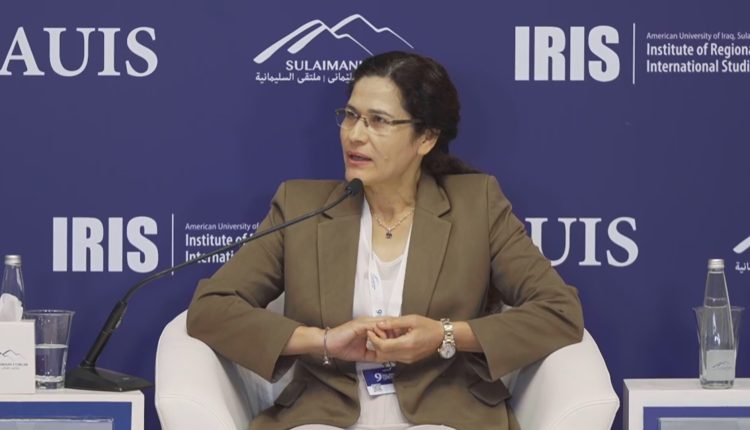Decentralized system key to end in Syria conflict – AANES official
QAMISHLI, Syria (North Press) – Ilham Ahmad, co-chair of the Foreign Relations Department of the Autonomous Administration of North and East Syria (AANES), stated on Thursday that a decentralized political system could be key to ending Syria’s ongoing conflict.
Ahmad added that the AANES seeks to reach an agreement with the transitional government in Damascus to establish and define a new political system for Syria.
Ahmad’s remarks came during the second day of the ninth Sulaimani Forum, organized by the American University of Iraq in Sulaymaniyah in Kurdistan Region of Iraq, which focused on critical issues related to Iraq and broader regional dynamics.
She praised the experience of KRI as a valuable example for Kurds and others participating in a pluralistic political system, though she stressed that Syria’s situation differs markedly due to its multicultural and diverse composition. Ahmed emphasized the importance of acknowledging this diversity in shaping Syria’s future political framework.
Highlighting the failures of Syria’s centralized governance over the past decades, Ahmad argued that a decentralized system is necessary to ensure the rights of all components of Syrian society and to prevent future conflicts.
She warned that persisting with a centralized state would only fuel further tensions, stating, they insist on a participatory political system, while criticizing the current reality where the transitional government unilaterally decides appointments and policies.
Ahmad also addressed reports of an American troop withdrawal from northeastern Syria, saying that such rumors surface from time to time, but U.S. forces, although present in small numbers, remain in the region under the framework of the Global Coalition.
Regarding regional diplomacy, Ahmad revealed that the AANES is engaged in both direct and indirect dialogue with Turkey, describing progress in this area as crucial for facilitating broader understandings with Damascus.
She stressed that building relationships among neighboring countries in conflict is vital for Syria’s recovery, and affirmed the AANES’ readiness to establish alliances with all regional states—provided that Syria is not turned into a battleground for external powers.
Ahmad reiterated that the AANES’ primary goal has always been to resolve the Kurdish issue within a Syrian national framework. Turkish interventions have unfortunately obstructed any strategic agreement among Kurds, she noted.
Ahmad highlighted that their ultimate objective is to reach an agreement with Damascus that enshrines a decentralized, pluralistic Syria, and guarantees the rights of Kurds and all other communities in the Syrian constitution.

